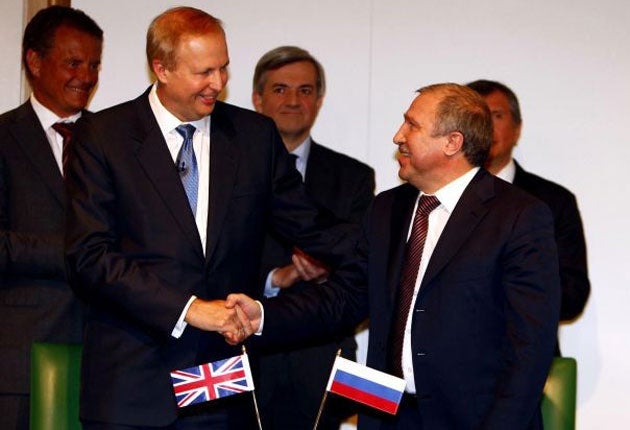Russian state oil giant takes $7.8bn stake in BP
Huhne attends signing of deal to hunt for resources in Arctic

BP, the British oil giant, last night staged a dramatic rapprochement with the Russian government, signing a broad new alliance with the country's state-owned oil company, Rosneft, to hunt for oil and gas in the Arctic.
BP's chief executive Bob Dudley and Vladimir Putin, the Russian Prime Minister, called it "an alliance based on mutual advantage", and said the British company will swap 5 per cent of its shares, valued at $7.8bn (£4.9bn), for 9.5 per cent of Rosneft.
Under the deal, BP will help exploit new oil and gas exploration licences awarded to Rosneft last year, which cover approximately 125,000 square kilometres in the shallow waters of the South Kara Sea, an area roughly equivalent in size and prospects to the UK North Sea.
The extensive cross-shareholding between a publicly-traded international oil major and a state-owned oil company is a first for the industry, BP said. More than one-quarter of BP's oil production already comes from Russia, through its 50 per cent-owned venture TNK-BP, and it already owns 3 per cent of Rosneft.
Over time, the new alliance could shift the balance of BP's interests away from the US and the Gulf of Mexico region where a ruptured well spewed an estimated five million barrels of oil into the ocean last year. That disaster caused an outpouring of public and political anger, raising questions over whether its safety record will count against it in future attempts to expand its activities in the US.
Its Russian deal immediately threatened to cause additional problems for BP in the US, however, as one lawmaker called for it to be reviewed the US Treasury on national security grounds. Edward Markey, a senior Democrat in the House of Representatives, said: "BP once stood for British Petroleum. With this deal, it now stands for Bolshoi Petroleum...This acquisition will almost certainly complicate the politics of levying and collecting damages from BP following their Gulf of Mexico oil spill. Negotiations between BP and Rosneft were formally tied up yesterday at a meeting at Mr Putin's personal residence in Moscow, after which the Prime Minister emerged to give his personal blessing to the deal.
Earlier in the day, BP had described the visit as "routine", yet it was anything but. Mr Dudley was forced out of his job as chief executive of TNK-BP in 2008, and out of Russia amidst extraordinary acrimony, when minority investors in the venture turned on him. BP claimed he was subjected to an orchestrated campaign of harassment, including accusations of industrial espionage and labour law violations, before eventually being forced to carry on his duties from abroad because of intractable visa disputes.
Igor Sechin, Mr Putin's deputy prime minister and Rosneft's chairman, flew with Mr Dudley to London for a hastily convened signing ceremony last night, which was attended by the UK Energy Minister Chris Huhne and held in front of the media. The ceremony and subsequent press conference, at BP's St James's Square head office, was conducted with simultaneous English and Russian translation.
BP shares spiked higher in late trading in New York as word of the talks with Rosneft leaked out. The companies called the deal a strategic global alliance, bringing BP's expertise to bear on exploring for oil and gas along the Russian Arctic shelf, and funding for new technology.
Shrinking polar ice is opening up new opportunities, and five nations – Russia, Canada, Denmark, Norway and the US – claim jurisdiction over parts of the polar region, which could contain as much of one quarter of the world's undiscovered reserves of oil and gas.
Charlie Kronick of Greenpeace said the deal meant BP had "bought its way into the Arctic by the back door". He said: "The Arctic is the world's most fragile environment for oil exploration, while its ice sheet is melting rapidly due to climate change. Any company that drills for oil there forfeits any claim to environmental responsibility."
Rosneft: Company history
*The company's listing on the London Stock exchange in 2006 was opposed by George Soros, the billionaire hedge-fund manager, who described it as "an instrument of state". It was set up in 1993 as a state enterprise. Ten years later it was producing 20 million barrels of oil but this more than tripled in 2005 following acquisitions made possible by the break-up of Yukos, which was controlled by the oligarch Mikhail Khodorkovsky until he was jailed.
Subscribe to Independent Premium to bookmark this article
Want to bookmark your favourite articles and stories to read or reference later? Start your Independent Premium subscription today.

Join our commenting forum
Join thought-provoking conversations, follow other Independent readers and see their replies